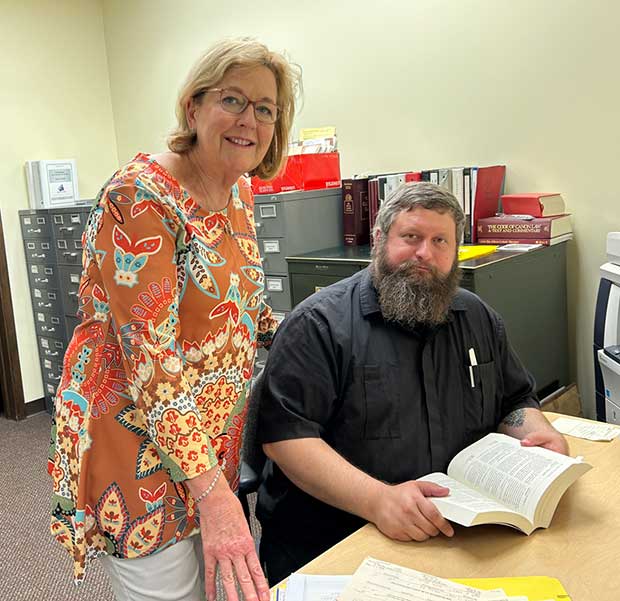
The hoop barn on the Pieper Farm in Donnellson served as the setting for Mass on the Farm and Blessing of the Seeds April 15. Father Dan Dorau presided at the Mass. The four parishes he leads in Lee and Van Buren counties collaborated.
(Editor’s note: The Catholic Messenger begins a series on the Tribunal of the Diocese of Davenport. The following introduction provides a compelling explanation of the Tribunal, based on an interview with Father Paul Appel, the diocese’s judicial vicar.)
The Tribunal of the Diocese of Davenport exists to assist the bishop in deciding matters of law within the diocese. Canon 1420 §1 states: “Each diocesan bishop is bound to appoint a judicial vicar, or officialis, with ordinary power to judge, distinct from the vicar general.” Along with the judicial vicar, a number of other clergy and staff take care of everything from marriage cases to parish boundaries. Over the next few months, the tribunal staff will travel around the diocese to put on a presentation about the annulment process for those who are interested. It is our hope that through this process many people can find healing and closure after a divorce.
To understand the current annulment process, it might be helpful to understand better the state of marriage in the world and the change in people’s attitudes toward marriage. In previous generations, most people witnessed a much more “traditional” form of marriage in their families. That experience began changing in the 1960s and peoples’ lived experiences began leading to different attitudes about married life.
Under the 1917 Code of Canon Law, the purpose of marriage was simply for the procreation and education of offspring as well as a remedy for concupiscence (sexual desire). In the 1983 Code, the Church broadened the definition to include some new things. Canon 1055 §1 states: “The matrimonial covenant, by which a man and a woman establish between themselves a partnership of the whole of life and which is ordered by its nature to the good of the spouses and the procreation and education of offspring, has been raised by Christ the Lord to the dignity of a sacrament between the baptized.”
Many young people do not see having children as a priority in marriage; hence, the increasing rates of contraception and declining birth rates. Further, faith is playing a smaller role in many people’s lives. As a result, sharing a similar faith background is not considered an important factor during courtship. Finally, divorce has become commonplace in modern society and many young people have the attitude that “I will stay married forever unless the other person does something wrong or my feelings change.”
I have served in the Tribunal for over a decade now, first as a student and then as the judicial vicar. In that time I have examined hundreds of failed marriages. Over time, it has been impossible to miss certain factors that keep appearing in the testimonies that we receive. The causes for divorce are often based on the factors mentioned above; differing values, religion, family upbringing, and the rearing of children. Most couples can overcome one of these issues, but when three or four are in place it becomes very difficult to live out a happy and successful married life. That is to say nothing of problems with mental illness, substance abuse and spousal violence.
It is imperative that young people are given both good examples of marriage and a realistic understanding of what it takes to stay married to the same person for one’s whole life. While feelings of love during courtship are exceedingly important, those feelings are not sufficient for the long haul. Married couples need to understand how to build a home together, raise children, share their faith, communicate honestly, turn away from sinful behaviors and support one another in all aspects of their lives. Successful marriages involve a lot of prayer, hard work and sacrifice.
The Church recognizes that marital relationships evolve with time and change along with the couple’s life experiences. Making a commitment to sticking together through these changes builds a marriage. Marriage has to be modeled and people need to be shown that what the Church teaches is worthwhile. Pope Francis recently spoke to the Tribunal in Rome and shared the following words on holy matrimony: “[The word ‘bond’] is sometimes looked upon with suspicion, as if it were an external imposition, a burden, a ‘tether’ in opposition to the authenticity and freedom of love.”
“If, on the other hand, the bond is understood precisely as a bond of love, then it is revealed as the core of marriage, as a divine gift that is the source of true freedom and which guards married life,” he said.
In our next article we will take a closer look at what happens when a marriage falls apart and how the annulment process begins.











